The crackdown on opposition protesters by Malawi’s democratically elected government led to the deaths of 19 people last week and triggered the U.S. suspension of a prized $350 million development grant to the tiny sub-Saharan African nation. According to Kim Yi Dionne, a political scientist at Texas A&M University and former Fulbright Scholar in Malawi, the U.S. held off in announcing the suspension until this week in hopes that Malawian President Bingu wa Mutharika might condemn the crackdown. “The U.S. probably waited to see if he didn’t order the police to shoot people,” Dionne told Trend Lines yesterday. “They didn’t […]
Aid and Development Archive
Free Newsletter
The United Nation’s declaration of a famine in two regions of southern Somalia has been accompanied by horrific reports of starvation and news of more than 100,000 internally displaced people flooding into Mogadishu. Already bearing the burden of a 20-year-old civil war, the Somali capital now appears to be emerging as the epicenter of the famine’s misery as well. However, the exodus of starving Somalis may also have volatile regional ramifications, specifically in neighboring Ethiopia and Kenya, says Elizabeth G. Ferris, codirector of the Brookings-LSE Project on Internal Displacement in Washington. Ferris reminded Trend Lines yesterday that Kenya is already […]
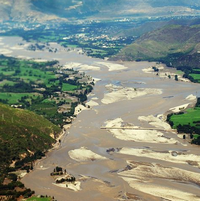
When historians come to write the history of the European Union in the period following the ratification of the Lisbon Treaty in 2009, they are likely to describe it as a litany of jarring crises. They will naturally prioritize the financial shocks to the eurozone in 2010 and 2011. But they will also have to make space for at least two major humanitarian crises that sparked angry debates about the EU’s global role. The first was the earthquake that hit Haiti in January 2010. The second was the man-made disaster in Libya that began in February 2011. The Haitian catastrophe […]
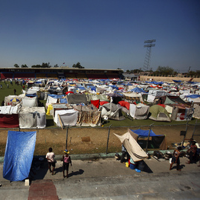
Over the past several decades, responses to major disasters have become an important responsibility of the international community. In that time, the global disaster-response system has evolved to cope with the increased human and material consequences of geophysical events. Nevertheless, shortcomings of the current system have become increasingly apparent and must be addressed in order to strengthen it. Much of the discussion of how to do so contrasts centralized global solutions with decentralized regional solutions. To get a better idea of the relative merits of both approaches, it is necessary first to understand the key components and overall architecture of […]
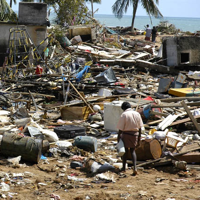
On Dec. 26, 2004, a massive earthquake shook Aceh, Indonesia, sending tsunamis racing across the Indian Ocean to shatter communities as far away as Somalia. Many of the countries struck by the destructive waves were embroiled in major, often-violent, political conflicts at the time. Indonesia’s Aceh province and Sri Lanka, the two worst-hit locations, had each experienced a decades-long internal conflict that had taken thousands of lives. At the time, many wondered whether the tsunami disaster would affect the conflicts, potentially bringing peace. Would violent means be set aside to achieve a common humanitarian purpose of helping people and communities […]
In late-June, the U.N. Security Council renewed the mandate of the peacekeeping mission in the Democratic Republic of the Congo (DRC), despite calls by DRC leaders for its withdrawal and fierce criticism of the mission’s failure to halt the country’s rape crisis. In an email interview, Theodore Trefon, senior researcher at the Royal Museum of Central Africa in Belgium and author of the forthcoming book “Congo Masquerade,” discussed the U.N.’s peacekeeping mission in the DRC. WPR: What are the main challenges facing the U.N. in the DRC? Theodore Trefon: Powerlessness is the word that best captures the challenges facing the […]
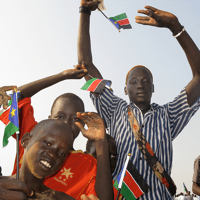
On Saturday, South Sudan achieved formal independence from the central Sudanese government in Khartoum. The event was cause for considerable celebration as well as several rounds of expressions of concern from observers in Africa and the West. While the status quo was untenable, the prospects for South Sudan look far from bright. It lacks both a well-defined border with its hostile mother-state and control over much of its own territory, and appears to have minimal administrative, military or normative capacity. In other words, it’s a disaster waiting to happen. The bleak scenario facing Juba raises the question: What have we […]
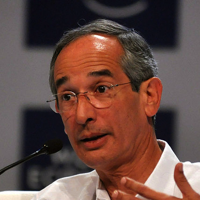
Guatemala is confronting numerous problems as it prepares for presidential elections scheduled for Sept. 11. Organized criminal groups have made parts of the country all but lawless. Corruption and poverty remain widespread. Frequent natural disasters have strained state capacity. Even the preparations for the elections themselves have been plagued by political violence, with two dozen political workers killed in 2011 alone. But one problem has yet to become a major feature of the presidential campaign, despite its gravity: food insecurity, which threatens millions in Guatemala. With food prices rising globally, social upheaval over increasingly expensive basic staples has become more […]
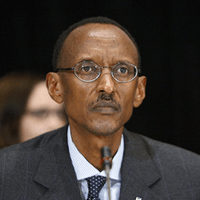
KIGALI, Rwanda — Young, radiant and eloquent, Clare Akamanzi is anything but modest as she outlines her government’s plans for Rwanda’s future. As chief operating officer of the Rwanda Development Board, an institution mandated with fast-tracking private sector growth, Akamanzi is a rising star among Rwanda’s best and brightest and the day-to-day brains behind one of the boldest development visions on the planet. Here, in this former conflict-ridden backwater best known to the world for its grisly 1994 genocide, officials are determined to forge Africa’s first knowledge-based society — turning away from small-scale agriculture and embracing services like information and […]
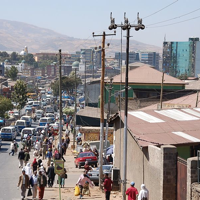
In 1999, Amartya Sen, an Indian economist who a year earlier had won the Nobel Prize for Economics, published “Development as Freedom.” Sen mapped out two arguments for a general audience. First, he defined economic development as the expansion of individual freedom, challenging “narrower” views that reduced development to GNP growth or a rise in personal incomes. Sen’s ideas spurred the creation of the U.N. Human Development Index, which created a composite measure of development that included income, health and education. Second, Sen maintained that democratic political arrangements, defined as the existence of civil and political freedoms, were necessary to […]
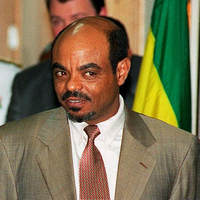
A former resident of Addis Ababa returning today after an absence of five years would find the city almost unrecognizable. In that time, Ethiopia has transformed itself economically, and nowhere is that transformation more on display than in its capital. In terms of infrastructure and housing, Addis Ababa has blossomed from perhaps Africa’s worst example of urban planning into a grid of paved streets and multilane ring roads, with corresponding glass-walled high rises and luxury villas comparable to Johannesburg, South Africa. The Ethiopian government has used its unlimited power to bulldoze whole neighborhoods, evicting residents with little notice or compensation […]

The sense of ideological triumphalism with which China recently celebrated the 90th anniversary of Communist Party rule echoed a flood of recent books and analyses in the West that have readily embraced that same sentiment. Nevertheless, there is a growing mountain of evidence that suggests China’s “unprecedented” economic accomplishments are far less impressive than popularly imagined. And with the region’s “demographic dividend” already shifting from China to both India and Southeast Asia, there are plenty of reasons to believe that Beijing — and the world — is just one financial crisis away from finding the “superiority” of state capitalism revealed […]
An ongoing effort by the Central African Republic to disarm rebel groups highlights the prominent role that disarming former combatants plays in peace agreements. In an email interview, Robert Muggah, research director of the Small Arms Survey and a research fellow at the Graduate Institute of International and Development Studies, discussed the process of disarmament, demobilization and reintegration. WPR: How significant are disarmament initiatives in post-conflict scenarios, and are there any scenarios in which they are counterproductive? Robert Muggah: Disarmament, demobilization and reintegration (DDR) is currently a fixture of the stabilization and peacebuilding landscape. The vast majority of the roughly […]
